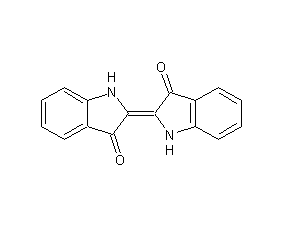
Structural formula
| Business number | 052E |
|---|---|
| Molecular formula | C16H10N2O2 |
| Molecular weight | 262.26 |
| label |
2-(1,3-Dihydro-3-oxo-2H-indol-2-ylidene)-1,2-dihydro-3H-indol-3-one, 2,2′-Bis(2,3-dihydro-3-oxoindolylidene), Indigo blue, C.I. 73000, Vat Blue 1 |
Numbering system
CAS number:482-89-3
MDL number:MFCD00005722
EINECS number:207-586-9
RTECS number:DU2988400
BRN number:88275
PubChem number:24853742
Physical property data
1. Character: blue powder
2. Density (g/ m3,25/4℃): 1.01
3. Relative vapor density (g/cm3,air=1): Undetermined
4. Melting point (ºC):300
5. Boiling point (ºC,Normal pressure): Undetermined
6. Boiling point (ºC,5.2kPa): Undetermined
7. Refractive index: Undetermined
8. Flash Point (ºC): Undetermined
9. Specific optical rotation (º): Undetermined
10. Autoignition point or ignition temperature (ºC): Undetermined
11. Vapor pressure (kPa,25ºC): Undetermined
12. Saturated vapor pressure (kPa,60ºC): Undetermined
13. Heat of combustion (KJ/mol): Undetermined
14. Critical temperature (ºC): Undetermined
15. Critical pressure (KPa): Undetermined
16. Oil and water (octanol/Log value of water) partition coefficient: Undetermined
17. Explosion limit (%,V/V): Undetermined
18. Lower explosion limit (%,V/V): Undetermined
19. Solubility: slightly soluble in water
Toxicological data
1 , acute toxicity: oral administration to miceLD50:>32gm/kg, no detailed description except the lethal dose;
Mouse transabdominal LD50: 2200mg/kg, no details except lethal dose;
2、Microbial OrganismTESTSystem Mutation: Bacteria–Salmonella Typhimurium :500nmol/plate;
Ecological data
This substance may be harmful to the environment, and special attention should be paid to water bodies.
Molecular structure data
1、 Molar refractive index:72.22
2、 Molar volume(m3/mol):185.0
3, Isotonic specific volume (90.2K):522.1
4、 Surface tension(dyne/cm):63.4
5、 Polarizability(10-24cm3):28.63
Compute chemical data
1. Hydrophobic parameter calculation reference value (XlogP ): 3.7
2. Hydrogen Bonding Number of donors: 2
3. Hydrogen Bonding Number of receptors: 4
4. Rotatable Number of chemical bonds: 0
5. Interchange Number of isomers: 17
6. Topological molecules Polar surface area (TPSA): 58.2
7. Heavy Atom Quantity: 20
8. Surface charge :0
9. Complexity :453
10. Isotope atomic number:0
11. Determine the number of atomic stereocenters:0
12. Uncertain number of atomic stereocenters:0
13. Determine the number of chemical bond stereocenters:1
14. Uncertain number of chemical bond stereocenters:0
15. Number of covalent bond units: 1
Properties and stability
Use and store according to specifications, no decomposition will occur, and avoid contact with oxides
Storage method
Save in a sealed manner and place it in a ventilated and dry place to avoid contact with other oxides.
Synthesis method
(1) Preparation of indigo. Edible indigo is actually disodium indigo disulfonate. Indigo is sulfonated with concentrated sulfuric acid. After the sulfonation is completed, it is diluted with water and then neutralized with soda ash. Finally, sodium chloride is added to salt out, and the finished product is obtained after filtering, washing, and drying.
(2) Preparation of indigo aluminum lake. Aluminum hydroxide is prepared from aluminum salts such as aluminum chloride and aluminum sulfate and alkali such as sodium carbonate, and then added to lemon indigo aqueous solution to precipitate to obtain the product.
Purpose
is used as a food coloring agent. Our country stipulates that it can be used in red and green silk, with a maximum usage of 0.02g/kg; in fruit juice (flavor) drinks, carbonated drinks, prepared wine, and candies , pastry decorations, dyed canned cherries (for decoration), and green plums, the maximum usage amount is 0.10g/kg; the maximum usage amount in dipping side dishes is 0.01g/kg.

 微信扫一扫打赏
微信扫一扫打赏

